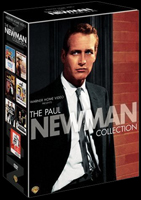 BUY IT AT AMAZON: CLICK HERE!
BUY IT AT AMAZON: CLICK HERE!
STUDIO: Warner Bros.
MSRP: $59.98
RATED: Various
The Pitch
He has piercing
blue eyes, a formerly chiseled jawline, a philanthropic bent, and one of the
longest-lasting
blind a convent with the glare of the sun off his oiled chest. A god, in
shorter words, as remembered in the silver and golden pantheon. And unlike that
Apollo poser, Newman possessed both beauty and
talent. Take that.
Warner
Bros. have assembled seven of his films into one attractive little set. But
what gets included when you can’t or won’t bring in Butch Cassidy and the Sundance
Kid, Cool Hand Luke, or the Tennessee Williams films? Read on,
MacDuff.

The Mackintosh Man
RUNNING TIME: 99 min.
SPECIAL FEATURES:
• Vintage featurette: "John Huston: The Man, The Myth, The Moviemaker"
• Theatrical trailer
The Humans
Paul
Newman, James Mason, Dominique Sanda
The Nutshell
Joseph
Rearden (Newman) is one of British Intelligence’s best chameleon agents. He can
infiltrate any organization, which makes him the perfect candidate to … botch
a diamond heist and wind up sentenced to a decade in prison, only to stage an
elaborate escape attempt? John Huston guides this story of Cold War intrigue
with one hand over your eyes to keep you in the dark, and one hand over his
mouth to keep himself from chuckling.
The Lowdown
In an era
of spoilers, and of debate on the value of spoilers, here’s a great thriller
that you really shouldn’t let anyone spoil for you. Not because, like Hitchcock
with Psycho,
there are twists that Huston would rather you didn’t know, but because Huston
has a very deliberate path to follow, and he would prefer you to walk backwards
along it, to see where you’ve been but not where you’re going. You won’t ruin
any particulars of the plot by reading more complete summaries of the film, but
you will sacrifice some of the joy of the journey.
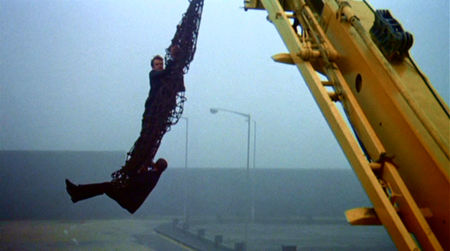
For their next trick, The Flying Dutchmen will performing the spectacular Aeriel Pantsing!
And
considering this is John Huston, the fun of the journey is plenty rewarding to
preserve. The characters all know, for the most part, where they are going,
which means that the whole film assumes something of a knowing grin, where the
audience isn’t quite in on the joke. That’s fine; it means we get to keep the
thrill of revelation all to ourselves.
The cast
that Huston chose to share the secrets with is an interesting one. James Mason
as a member of parliament is I suppose somehow appropriate, but he’s stiff as a
classically-trained plank. Dominique Sanda as the sole femme has a fascinating
arc, but a simple one. Newman is the only one who gets to display much of a
conflict, though in the final estimation his character is apparently even more
uncomplicated than Sanda’s. This is Huston, of course; he was deft at using
place and time as supporting metaphor of character and change, and his choices
here are right on target, from barren moors to a vacant church.
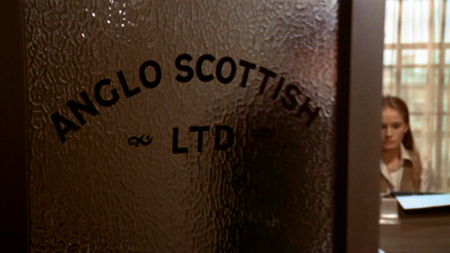
No Welsh
Huston’s
work has occasionally been criticized for its simplicity of character and plot.
The
Mackintosh Man could attract a few legitimate complaints of the same.
The progression of the conflict, though blinded, moves from simple to simple. In
my opinion, though, it’s a fine and underused mode of storytelling, one that
puts a lot of focus on the storyteller. The Mackintosh Man is far from the hard-boiled, twisted
spy flicks of its time; rather, I’d say it has been cooked just long enough for
all the fat to have burned away.
The Package
There’s a
short, vintage featurette called "John Huston: The Man, The Myth, The
Moviemaker" which does a little biography/bibliography of the director. You
also get a theatrical trailer.
7 out of 10

Harper
RUNNING TIME: 121 min.
SPECIAL FEATURES:
• Commentary w/ William Goldman
• Introduction w/ TCM’s Robert Osborne
• Theatrical trailer
The Humans
Paul
Newman, Lauren Bacall, Janet Leigh, Robert Wagner, Julie Harris
The Nutshell
Here’s
your complicated plot, if the landscape of The Mackintosh Man wasn’t for you. A
few years before
Harper, an irreverent, selfish, clever dick of a private investigator. In a
script from William Goldman, Harper dances through the thick web woven by half
a dozen pieces of high-class
The Lowdown
The mood
may not be as oppressive as the classic noirs of the forties and fifties, but
1966’s Harper fits alongside them without a self-conscious bone in its
body. There’s plenty of fun to be had with the titular character’s sour
cynicism, and it wouldn’t stand out so starkly were the world around him draped
in gray and lit low-key. It works much better with
and the ridiculous self-involvement of the
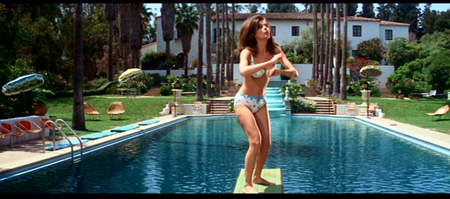
Film Blanc
Against
this backdrop, Harper is the sort of person your eye would naturally travel to.
His movements, conversations, and demeanor are all his own, and Newman inhabits
such quirks perfectly. It’s a general rule of noir that the protagonist finds
himself personally involved, and emotionally ruined, by the conclusion, but
Harper sidesteps that tradition and gives it a little pat on the rump as it
sails past. He suffers, sure, and he changes, but his cynicism is so well and
humorously installed that all the damage in the world just serves to give
evidence to his little religion of To Hell With It.
That
gives him a nice personal distance from all the Byzantine trails the plot
follows, and also lets him maintain an admirable pragmatism. Harper’s not in it
for justice; he’s in it because it’s his job. This split-rail approach to the
traditional detective story allows for one of the most laid-back confrontations
with a villain that I’ve ever seen, played for sardonic comedy and played well.
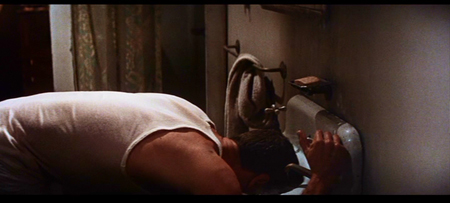
Pray to your porcelain gods, mortal!
Harper is one of those plot-centric films
that doesn’t ask a lot from its lead actor. Its layers of decadent crime make
for a very satisfying cake; that Newman so deftly enlivens the words from the
page is just sweet icing.
(I don’t plan to end every review with a tired
metaphor. It just happens that way.)
The Package
Here’s a
good one: screenwriter William Goldman provides an entire commentary track.
He’s all by his lonesome, but he is beyond a delight to listen to. Any aspiring
writer should sit and listen to his observations and wit; he’s of that breed of
writer who communicates as well in speech as he does printed on paper.
Aside
from that wonderful track, film critic Robert Osborne provides a brief and
informative introduction. You also get a theatrical trailer.
7.9 out of 10

The Drowning Pool
RUNNING TIME: 108 min.
SPECIAL FEATURES:
• Vintage featurette: "Harper Days Are Here Again"
• Theatrical trailer
The Humans
Paul
Newman, Joanne Woodward, Tony Franciosa, and a young, occasionally-clad Melanie
Griffith.
The Nutshell
Harper is
back! Last time we saw him, he was being tossed around the seedy seas of
transplanted to
bottom of a blackmail scandal amid the intricate family and political
machinations of the deep South.
The Lowdown
The mold
is similar to Harper, but The Drowning Pool successfully
creates a new situation without feeling derivative of its forebear. The grubby,
gumbo-y setting of metropolitan
and incest to the existing soup to keep Harper from stagnating like a bayou, or
a mixed-as-hell metaphor. The situation is different enough, and Harper’s
character is unique enough, to keep the film from feeling like more of the
same.
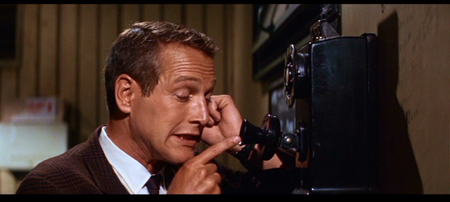
Don’t let him know you know, but there’s no one on the other end.
It’s a
successful bit of pop-fiction, in that a character and his general mode of
encounters are well-enough defined that the audience feels that character could
go just about anywhere and have a good story follow along.
The
talent behind the camera makes for a well-coiled plot, as well. Director Stuart
Rosenberg (who also directed Newman in Cool Hand Luke) invests a greater
importance in the supporting characters than was done in Harper, which gives
Harper’s investigation a bit more texture, and also puts more at stake for
everyone involved.
The Drowning Pool‘s merits are almost
indistinguishable from those of Harper, but the former’s sense of
character makes for a more tightly controlled story, which is a vital component
in the always-complex noir genre.
The Package
For
bonuses, you get a vintage promotional reel called "Harper Days Are Here
Again," which advertises the return of your favorite sly detective after
the decade between the first film and The Drowning Pool. Would it surprise
you to hear that you also get a theatrical trailer?
8.1 out of 10

The Young
Philadelphians
RUNNING TIME: 136 min.
SPECIAL FEATURES:
• Commentary w/ Vincent Sherman and Drew Casper
• Theatrical trailer
The Humans
Paul
Newman, Barbara Rush, Brian Keith, Diane Brewster
The Nutshell
Anthony
Lawrence has a fine name, well-respected in the
didn’t come by it exactly honestly. So while his relations eat caviar with
their silver spoons, he works in construction to put himself through law
school. When the opportunities to rise in the ranks of Philly’s elite start coming
hard and fast, which part of his character will survive: the ingratiating
prince-to-be, or the honest, blue-collar Irishman?
The Lowdown
The Young
Philadelphians
is a big ol’ melodrama. Its characters are assembled from layered archetypes,
kinda like those books where you can mix and match a monster’s legs, chest, and
head. Its situations shift around to create the interest and the progression of
the plot. A good melodrama, which this certainly is, reminds me of those little
puzzles with the numbered squares you have to shift around in a grid to put in
the right order. It doesn’t really matter what’s printed on the squares except to
make it clear where the they ought to end up.
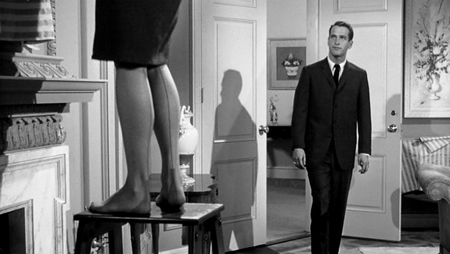
The only woman in the forties whose legs didn’t go all the way down.
In other
words, the numbers don’t particularly need
to display convincing, nuanced arcs, as long as there is a conflict between
where they start and where they need to end. With that in mind, The
Young Philadelphians scores wonderfully. Its opening moves build a
quiet camaraderie in the ranks of the young generation, pitting them tacitly
against their elders and betters. The lie of youthful immortality builds to
just the point where it’s strong enough to break the backs of everyone who
follows it, and then it disappears.
In its
absence, Newman’s Anthony stands up as quite the shark, the number one on his
position from somewhere lost in the middle of the grid to his rightful place. The
generation lines blur as the characters shift from fulfilling this role to
that. The story takes place over a good many years (and doesn’t always do a
good job of letting the audience know that time has passed) so there is plenty
of time for huge chances to manifest.

Animal, vegetable, or mineral?
The
complicated family, extended family, business, and romantic relationships add a
layer of deceit and plotting that turn’s Anthony’s ambitions into a tangle of
aborted dreams and realized goals. The pure entertainment of this film is
watching director Vincent Sherman solve the puzzle he has created for himself,
getting everyone, but particularly Anthony, to where he ought to be when the
credits roll.
The Package
Director
Sherman and film historian Drew Casper provide a full-length commentary. The
historical context of the film is much-discussed, as is its source-material, a
novel called The Philadelphian by Richard Powell. They manage to cram in a
lot of information, but some of it seems to be free association from a pair of
minds deeply involved in the history of film. I’ve got no problem with that,
honestly.
Every
night I pray that I will get a theatrical trailer. Today, my prayers are
answered.
7.4 out of 10

Somebody Up There
Likes Me
RUNNING TIME: 113 min.
SPECIAL FEATURES:
• Comentary with (holy crap) Paul Newman, Robert Wise, Martin Scorsese, Robert Loggia, Richard Schickel
• Theatrical trailer
The Humans
Paul
Newman, Pier Angelli (plus little glimpses of Robert Loggia and Steve McQueen)
The Nutshell
Thomas
Rocco Barbella (Newman) didn’t exactly lead an inspiring childhood. Abused by a
drunken father and mismanaged by a confused mother, he ended up with a rap
sheet several feet long by the time he turned eighteen. The crimes got worse,
and the punishments alongside, until he found redemption in the form of an open
call to enter the boxing ring at a local gym and the adopted name of Rocky
Graziano.
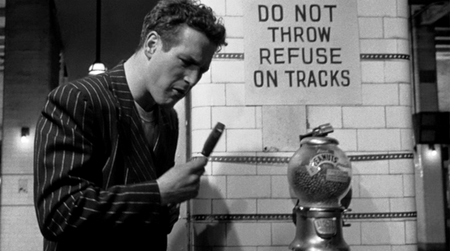
"Well, there goes option number three for suicide.
The Lowdown
The thing
I love about this movie is that it’s not at all shy about casting the sport of
boxing as a microcosm of Rocky’s world. In the real world, there are rules to
follow and consequences for breaking them. It’s also much easier to get the
things you want if you ignore them entirely. In the boxing ring, there are
rules to follow, and consequences if you get caught breaking them. Where the
real world has thousands of goals to tug a person’s motivation, boxing has only
one. This simplified world clamps down on Rocky’s focus, and breaks the world
into a bite-sized chunk. It’s an overt narrative technique, and it works.
This was
the film that kick-started Newman’s career, though it was his second appearance
on the big screen. It’s not hard to see how his performance as Rocky spun him
into the limelight. He covers a wide range of emotions, and displays all of
them with an character intensity that is just nuanced enough to suggest a
desperation beneath it all. Whether that belongs to Rocky or Newman is anyone’s
guess; mine is the former.
Everything
surrounding Rocky is pretty heavy on sentiment, and light on content. What
content there is depends on the audience’s personal investment in Rocky, whose
arc is somewhat predictable and less rewarding for it, and on the success of
the various explorations of providence as a significant contribution to a
person’s life. It’s worth thinking about, in the context of the story, but
sacrifices just that tiniest quality from Rocky’s development. An audience
likes to see a character succeed on his own merits, not suffer the implication
that his own involvement is very little. It’s the same reason we don’t like the
cavalry to come riding in at the last second.
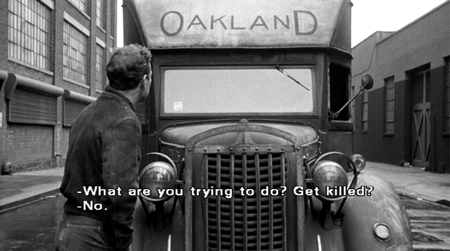
Did you know this is the first recorded example of sarcasm in film?
As a
display of early Newman, who shows he had what it takes right from the word go,
Somebody
Up There Likes Me is a worthy artifact. Judged on other merits, it’s a
lesser work.
The Package
Now, here
is the bonus worth buying the set for (or, if you haven’t got that kind of
cash, this disc individually): feature length commentary with Paul Newman,
director Robert Wise, Martin Scorsese, Robert Loggia, and Richard Schickel. We
call that a "damn fine showing," hereabouts. And you know the best
part? It’s a great commentary, in addition to being a fine list of names.
Unfortunately, the luminaries don’t have interaction with one another; their
recording sessions were apparently at different times. So, you get to hear individual
comments, remembrances, and bits of trivia. Scorsese’s and Newman’s
contributions are particularly engaging. It’s too bad they couldn’t all have
been in one room, but their respective bits add up to one packed track.
I also
have to applaud the disc authors for doing the right thing and including a
theatrical trailer.
6.7 out of 10

The Left Handed Gun
RUNNING TIME: 102 min.
SPECIAL FEATURES:
• Commentary w/ Arthur Penn
• Theatrical trailer
The Humans
Paul
Newman, Lita Milan, John Dehner
The Nutshell
Welcome
to the life of William Bonney, AKA Billy the Kid. It kinda goes up and down a bit, so hang on.
The Lowdown
The Left Handed Gun has got a great pedigree. Its
director, Arthur Penn, made the study of alienation something of a career-long
concern, which makes any of his studies on it worth checking out. (Bonnie
and Clyde was his capstone.) Its script comes from a play by Gore
Vidal, who knows a bit about alienation himself, and is deft at coaxing
sympathy for characters South of the mainstream. The rest of the package is
made up by Paul Newman as the youthful outlaw.
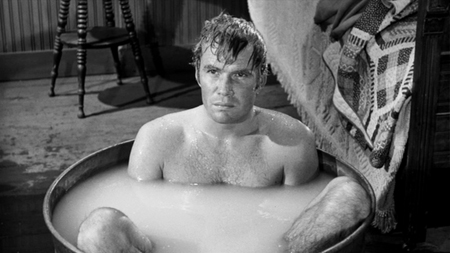
A good milk bath keeps a cowpoke’s skin supple on the long range.
Newman is
perfectly cast as Bonney. He’s charismatic, pretty, and mercurial. There’s a
hint of man-child about the character of Billy, a sense that though he’s fully
grown his brain hasn’t quite yet worked out that there are other people in the
world. He’s a fightin’ solipsist, and as it turns out that’s a dangerous sort
of selfish to have around. He’s got friends, to start with, but what they want
doesn’t matter in the slightest to him, be it a slug of water or a peaceful
wedding. At the same time, Billy’s whole career on the underbelly of the law
comes about because he murders a sheriff in bit of blood vengeance for a
murdered cattle boss that Billy liked.
The
material is dark, but the presentation is suitably fantastic, which gives it
the feel of something like Disney’s stories about Davey Crockett. It even
starts out with a ballad. It’s an obvious effort to keep the story from dipping
into hopelessness. Billy is cast as a sort of American Ned Kelly, the rogue
that steals the hearts of a nation. It’s not quite that serious, but Billy is
set up as less of an anti-hero and more of a mischievous child.
The Left Handed Gun is good fun, both because of a
story told with a campfire charm and because of Newman’s damn fine mood swings.
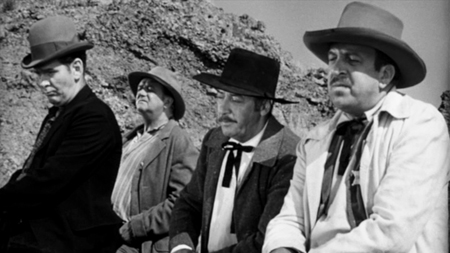
Bad Hat Brigade, unite!
The Package
When we
get a commentary, we get a good one. Director Arthur Penn provides a thoughtful,
biographical history of the context of the film’s creation, his experiences
with its star, and where the story fits in his personal mythology.
But you
know what really makes the disc worthwhile? That’s right. We get a theatrical
trailer, and I’m not really sure we’re worthy.
7.6 out of 10

Pocket Money
RUNNING TIME: 100 min.
SPECIAL FEATURES:
• Theatrical trailer
The Humans
Paul
Newman, Lee Marvin
The Nutshell
Jim Kane
(Newman) can’t manage to cut an even break. He’s got the life of a popular
country song — only the bottle loves me, wife left me for a pretty boy, mah
dog drove mah truck off a cliff, et cetera — which refuses to go along the
tracks he wants it to. When things go from bad to worse, he and his pal Leonard
(Marvin) hatch a few moneymaking schemes that would make the Coen brothers
proud.
The Lowdown
Here’s
another sort of Western for you, if you don’t dig the likes of The
Left Handed Gun. Like that film, we’ve got an excellent set of talents
in combination. The director is Stuart Rosenberg, who also directed The
Drowning Pool and Cool Hand Luke. The screenwriter is
one young man by the name of Terrence "Terry" Malick. And with Lee
Marvin and Paul Newman in the lead roles, well, somehow it ought to be rendered
into gold.
Gold
nuggets here and there, as it turns out. Newman’s interplay with Marvin is
quick and wonderful, the quintessence of one idiot trying to talk sense into
another idiot. The screenplay is structured nicely, with no dead weight and,
surprisingly, an awful lot of momentum. Malick’s custom as a writer/director
has never been to cut out of a scene early, but don’t worry: Pocket
Money moves along at a good clip.
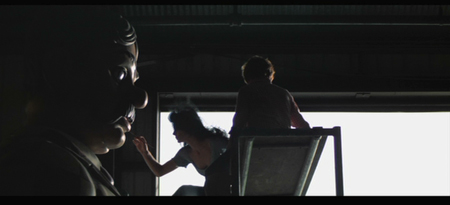
I wasn’t able to get caps for Pocket Money,
so here’s a giant troll from The Drowning Pool.
What
lessens the fun of the film is that most of the humor is situation-based
instead of character-based. As the characters develop, they begin to exhibit
more of a control on the direction of the humor, but still it feels more like
it’s trying to be a zany comedy like Bringing Up Baby rather than the
character-oriented sort implied by the somewhat mundane setting and character
archetypes.
There’s a
bottom line, though: it’s never dull. Pocket Money is probably my least
favorite of the films in this set, because its construction is the most at
conflict with itself, but it’s certainly not a boring film, and it shows
Newman’s ability to be both the straight guy and the comedic lead.
The Package
You asked
for it; they listened. A theatrical
trailer.
6.6 out of 10